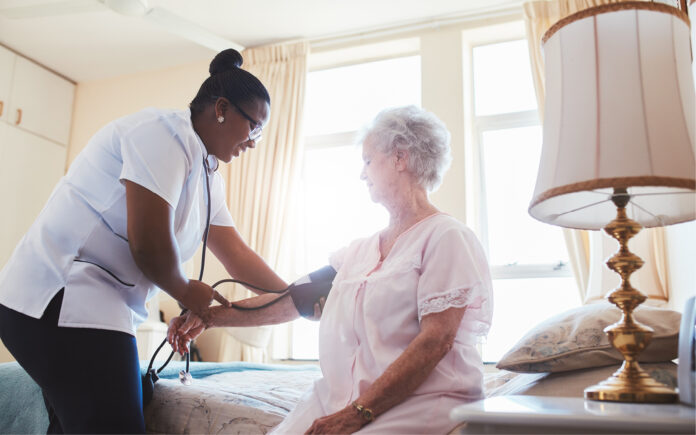As Baby Boomers get older, there’s a growing need for resources and information related to senior healthcare. The oldest “Boomers”, or people born after World War II – from 1946 to 1964 will be turning 76 next year. According to the 2024 U.S. Census data, by 2030 everyone in this demographic will be 65 years old or older. This population shift, often referred to as a “gray tsunami”, poses new challenges as children of these seniors try to navigate how to care for their aging parents.
How To Help
Knowing if or when to step in to help can be confusing when dealing with an elderly parent. You might not know where to even begin. Trying to determine what needs to be done and how to help can seem like an overwhelming task. What you’ll need is a plan.
Consider these 4 areas to come up with some specific ways to help:

1. Medical Needs
Try to pick up on clues about your parent’s health before any issues start to impact their daily activities. Connect with their doctors and go with them to appointments if possible. Be sure to fill out the necessary paperwork so you can have access to medical records and discuss issues that arise. Monitor your parents’ medications so you can be knowledgeable with the types of meds and dosages prescribed. Get familiar with their Medicare benefits and what is covered by insurance. If you don’t live in the same area and aren’t able to accompany them to doctor visits, consider hiring a caregiver who can help.
2. Socialization
Socializing with friends and family contributes to seniors’ mental health and improves mood, and memory. Regarding the memory, there are memory care facilities. They are specialized residential care facilities designed to provide care and support for individuals with memory loss, particularly those with Alzheimer’s disease or other forms of dementia. These facilities offer a safe and secure environment where residents can receive around-the-clock care and assistance with activities of daily living.
Meaningful connections with loved ones can ward off stress and anxiety as well as depression. Does your loved one have close friends or family they interact with on a regular basis?
If community living is a possibility, senior living facilities provide ways to meet new people and participate in planned activities with others. Another avenue to social interaction is by encouraging your parents to volunteer at an organization they are passionate about. Volunteering not only promotes socialization but gives a sense of “giving back” to their community. There are senior day care programs that allow for social interaction as well.

3. Independent Living
Living independently gives seniors a sense of purpose and allows them to continue to enjoy the lifestyle and activities they’ve always experienced. As parents age, be aware of any physical or mental changes that could affect their independence.
-
Safety
Try to pick up on clues about any health issues that might impact your parents’ safety at home. For example, how mobile are they? Is moving around difficult? According to the Centers for Disease Control and Prevention, 1 in 4 older adults will have a fall. Make sure their living space is uncluttered and free of slippery rugs. Their shoes should have soles that provide good traction and stability. Rearrange tall, hard to reach kitchen cabinets so all items are easily accessible without a step ladder or stool.
Take note of strength and balance issues if your parent has trouble standing up after sitting in a chair, or holds on to the wall when walking.
It may be necessary to install rails in certain areas of the house such as the bathroom or kitchen to ensure stability. A walker or cane from theelderexpo.com could be helpful as well. Check with your parent’s physician to get recommendations for a physical or occupational therapist if necessary.
-
Personal Hygiene
Taking care of personal hygiene and cleanliness is important to keep harmful bacteria from developing on the skin. Elderly people sometimes neglect this area because some personal care tasks become more difficult. Having a set daily bathing routine for your parents as well as purchasing some helpful hygiene aids can help. Shower chairs, rinse- free shower wipes, and shower bars are all items to make independent grooming easier.
-
Meals
Having access to healthy meals goes a long way in preventative healthcare. Plenty of lean meats, chicken or fish and fresh fruits and vegetables provide the nutrients seniors need to stay strong and healthy.
Help your parents plan easy meals with little prep and cooking time. Consider making meals yourself and freeze them until they’re needed. Meal delivery services are a great option especially if grocery shopping is difficult.

4. Cognitive Health
Talking about mental health with your aging parent can seem like a daunting task. But having the talk sooner rather than later can be helpful. Like an annual physical, talking to a parent about how they are doing mentally should be as normal as possible. If the time comes when they do need help, ease into the conversation and if possible, include them in any decisions that need to be made.
Some signs to look for in dementia or Alzheimer’s disease include memory loss, confusion, poor judgement, social withdrawal, and mood swings. Be sure to discuss any changes in behavior to a medical provider.
Keep a notebook handy to write down areas of concern as they arise. You’ll want to keep track of medications, resources, and questions you have on a daily or weekly basis.
Know Your Limits
Caring for your aging parent takes a lot of energy, time and work. It’s important to practice patience and compassion when dealing with your loved one, with them as well as yourself. Consider scenarios that would help you care for them and one of them can be found at Seniorstrong.org. Should your parents move in with you or to an area near you? Should they move to an assisted living facility?
Be aware of how much help you can provide without harming your own health. If you overcommit and try to take on too much, you risk burn-out and health issues of your own.
Seek Out Help
-Ask family members to run errands, clean the house or do meal prep.
-Hire a caretaker to assist during times you’re unavailable.
– Have groceries and prescriptions delivered.
-Reach out to organizations such as Area Agency on Aging, AARP, National Institute on Aging, and Senior Services Agencies for information and support.

Finding ways to care for aging parents effectively doesn’t have to be overwhelming. Finding the right balance for yourself and your loved ones takes plenty of planning and research to find the best options.
But don’t worry or get too stressed out. Seek out as many resources as you can to support your efforts and remember you’re not alone. You’ll be able to manage your aging parents’ needs as well as your own with the help of caring medical providers, family members, and support organizations.









